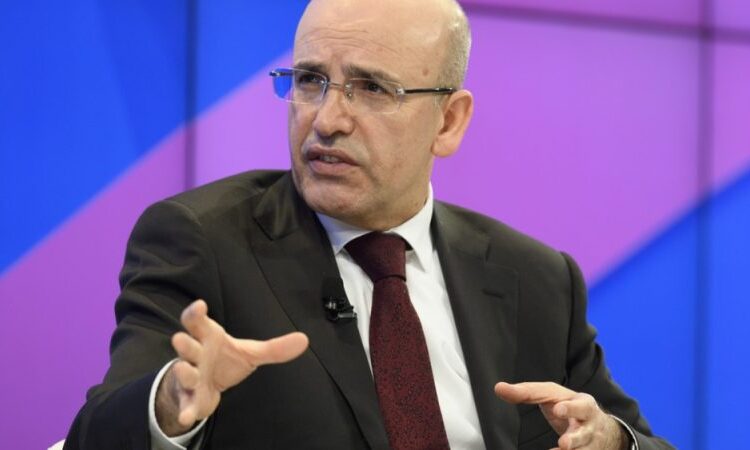
Turkey’s Finance Minister Mehmet Şimşek on Tuesday (14 May) called for his country to be “firmly re-anchored” in the European Union, adding that Ankara and Brussels share “equal blame” for the deterioration in their relationship in recent years.
Speaking at an event in Brussels hosted by Bruegel, an EU policy think-tank, Şimşek argued that Turkey’s long-stalled accession to the EU would boost the bloc’s share of global GDP and help address the problem of Europe’s ageing workforce.
However, he rebutted criticisms that Ankara’s worsening human rights record and democratic backsliding are primarily responsible for the regression in EU-Turkish relations, claiming that Europe’s lack of “leadership” is a key factor.
“I believe that Turkey should be re-anchored to the European Union and firmly so,” he said.
“[But] I think the biggest problem is that Europe — and I’m going to be strong here — lacks leadership and strategic perspective regarding Turkey. In my view, this is two-way traffic. Yes, we drifted away, but [in] an analysis of why, we probably have equal blame on Brussels as well,” he added.
Şimşek also specifically accused the EU of hypocrisy for preaching the virtues of free trade whilst failing to update the decades-old EU-Turkey Customs Union.
Signed in 1995, the agreement facilitated close to €200 billion in trade in goods in 2022, according to the European Commission. The EU is currently Turkey’s largest trading partner, while Turkey is the EU’s seventh largest.
“[By] upgrading the Customs Union, Europe will not be doing us a favour,” Şimşek said. “We want to compete on an equal footing. We want a level playing field. Supposedly, these are European values.”
‘Too big for some’
Official negotiations over Turkey’s accession to the EU began in 2005 but worsened significantly following a 2016 coup attempt against President Recep Tayyip Erdoğan, which led to tens of thousands of Turkish citizens being detained and sweeping crackdowns on the media and judiciary.
In 2019, the European Parliament urged the Council and Commission to suspend accession talks with Ankara, citing a lack of judicial independence, democratic backsliding, and limits on freedom of expression.
Şimşek, however, suggested that European resistance to Turkish membership is not due to the country’s creeping authoritarianism but instead because it is “too big”.
“Culturally, religiously, yes, we’re different,” he said. “But supposedly Europe is about values, quote-unquote. I think the issue is that we are too big for some.”
Equal treatment
In a thinly veiled allusion to the country’s increasing economic ties with Russia, Şimşek also emphasised that Turkey has the ability to “look elsewhere” beyond Europe and the United States if relations do not improve.
He also warned that Europe’s recent “ignoring” of Ankara could ultimately prove “quite costly”.
“Trade-wise and investment-wise, we can look elsewhere,” he said. “But we want to mend fences with the geographic West — that’s the EU — and the non-geographic West — that’s the United States. Because we see that need. But we also want equal treatment and respect. This is key.”
Despite the difficulties, however, Şimşek ultimately expressed optimism about the future of EU-Turkish relations.
“I think the outlook is positive,” he said. “While there certainly are some grey clouds, it’s not gloomy. It’s more constructive than many people think.”
[Edited by Alexandra Brzozowski/Alice Taylor]







